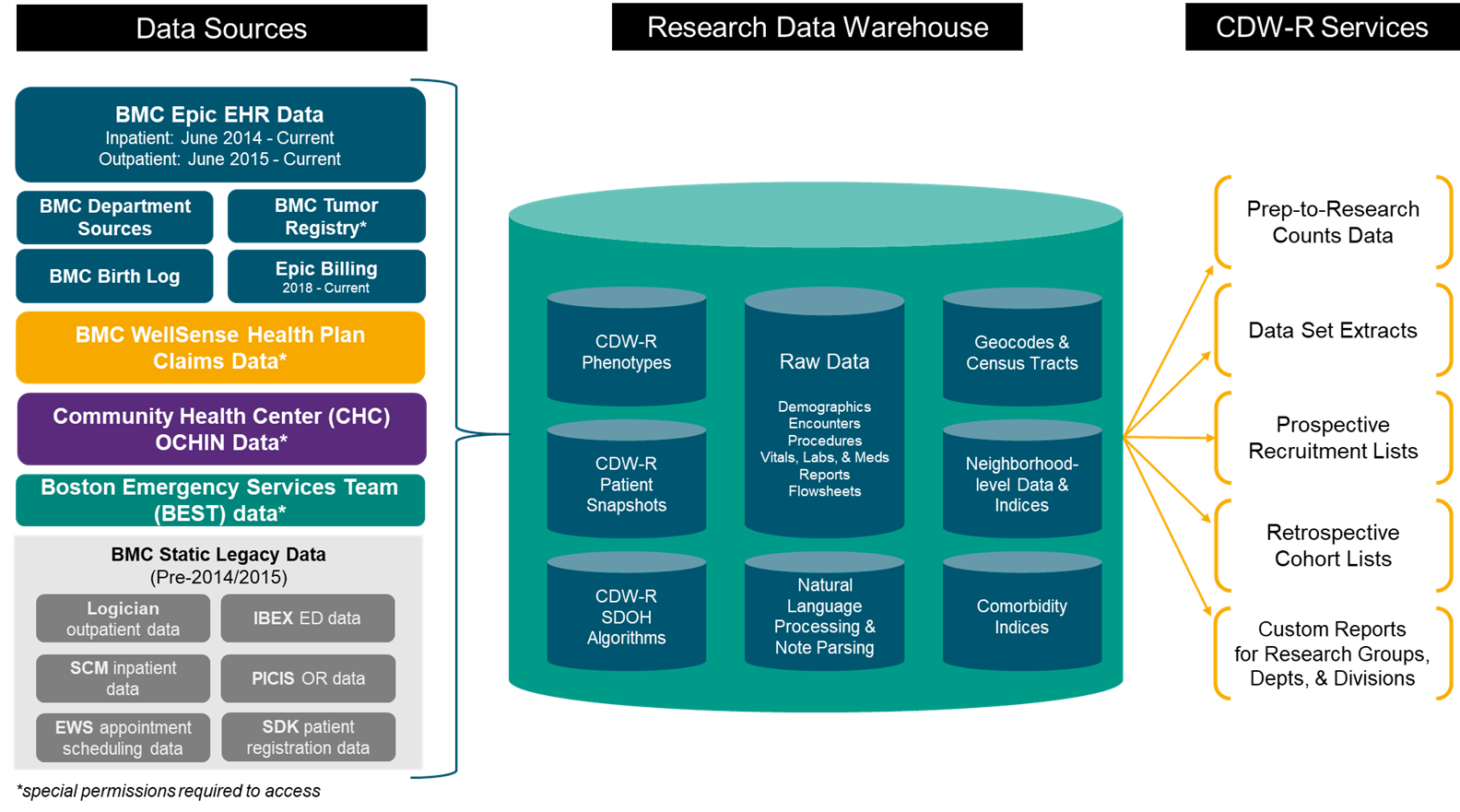Overview: Data in the Research Data Warehouse
CDW-R analysts extract and link data from various health system data streams, and data from many of the systems that contribute to the Research Data Warehouse can be cross-referenced or linked using unique patient identifiers. In addition, CDW-R develops algorithms and phenotypes for identifying patients, characteristics, and conditions - improving data quality, capture, and consistency.

Clinical Data
BMC Electronic Health Record (EHR) data are pulled from Epic. Available clinical data include patient demographics, data collected during health care encounters (in-patient admissions, offices visits, emergency department visits, surgical procedures, telemedicine, etc.), diagnoses, procedures, documentation flowsheets, lab values, medications, and clinical notes. General Rule: If it is in a BMC Epic health record, it’s likely in the data warehouse! (See Data that Require Special Approvals to Access and Data that Cannot Be Used for Research Purposes below).
BMC implemented Epic EHR in an inpatient setting in mid-2014; outpatient in mid-2015; and Epic billing in mid-2018. ICD-10 was implemented on October 1, 2015. Data are collected and consolidated into the Research Data Warehouse on a regular schedule, but not in real-time. In some instances, certain data elements that are visible to frontline Epic users may be generated at the point of care and may not be captured within the data warehouse. The CDW-R team will work with your study team to find the data necessary for analysis.
In addition to data from BMC Epic, the data warehouse includes clinical data from various data systems that are no longer in active clinical use (legacy systems). These legacy systems include PICIS (operating room data), IBEX (emergency department data), SDK (patient registration data), SCM (inpatient EHR data), Logician (outpatient EHR data), and EWS/IDX (patient scheduling data). CDW-R can extract data from legacy clinical systems; however, legacy systems are not actively maintained, data from them are not monitored for quality, and extracting legacy data can double the amount of data analyst coding time required to extract data. We encourage researchers to consider whether their research question and/or sample size requires data from legacy systems.
Data that Require Special Approvals to Access
With additional permissions and approvals, CDW-R can also provision data with additional protections, including special populations, participating Boston HealthNet Community Health Center (CHC) data, BMC WellSense Health Plan Claims data, and other data sources.
Data in the EHR that require special, additional approvals to access for research purposes:
- Part 2 SUD Clinic Utilization Data: 42 CFR Part 2 regulations (‘Part 2’) protect data that identify individuals as receiving services from federally-assisted programs for the treatment of substance use disorders (SUD), including programs in primary care settings. The BMC/BUMC IRB facilitates this approvals process. Contact the BMC/BUMC IRB with questions.
- HIV Status: HIV status data cannot be disclosed to anyone outside the BMC covered entity. Special permission is required if a BMC researcher needs to access data regarding HIV status disclosure. The BMC/BUMC IRB facilitates this process.
External data sources that require special, additional approvals to access for research purposes:
- CHC data: Although data from affiliated Boston HealthNet CHCs may be visible to clinicians who sign into BMC Epic, these data are considered to be external to BMC and cannot be used for research without permission. With approval, CDW-R can provision data from OCHIN – a different version of Epic used by a national network of CHCs. CDW-R has access to data from the following CHCs: Boston Health Care for the Homeless Program, Codman Square, DotHouse, Greater Roslindale, Mattapan Community, South Boston, South End, Upham’s Corner. Permission from each Boston HealthNet CHC is required to access CHC data - including for prep-to-research and aggregate count requests. Visit the Boston HealthNet Research Collaborative website to request access.
- WellSense Health Plan claims data: WellSense Plan data are owned by the Massachusetts Executive Office of Health and Human Services (EOHHS). Project-specific MassHealth approval is required per BMC Health System’s contract with MassHealth for research and/or publication of any analysis that uses WellSense data (either research or quality improvement). BMC WellSense Health Plan legal team facilitates the project-by-project MassHealth approvals process. Email cdw@bmc.org with questions.
- Vaccine Data: Researchers may only access data on vaccines given at BMC. Special permission is required if data are extracted from the Massachusetts Immunization Information System (MIIS), which contains data on vaccines administered outside of BMC. Email cdw@bmc.org with questions.
Data that Cannot Be Used for Research Purposes
Per Hospital System contracts and patient privacy notifications, researchers cannot access medical record data/components from other institutions via tools that enable secure exchange of patient information with other organizations for health care operations. If any data from another institution are accessed, whether it be by somebody on the team or outside the team, that institution is engaged in research and would need their own IRB review or to be added to a BMC/BUMC IRB via a reliance agreement. Whether somebody is credentialed at or affiliated with another institution in addition to BMC does not alter these requirements. These requirements remain in place even if a researcher is credentialed or affiliated with an outside organization whose patient data are visible via BMC's Epic.
- Community Connect Data: Community Connect is an Epic feature that allows CHCs to integrate their EHR data within a larger health system. Community Connect data cannot be retrieved via manual chart review in Epic for research purposes. For access to CHC data, see the above description to secure approval from each participating Boston HealthNet CHC.
- Care Everywhere: Care Everywhere is an Epic feature that allows clinicians to view records across organizations for care delivery purposes. Although data from institutions outside of BMC may be visible to clinicians in Epic, these data are for clinical and health care operations purposes only. Care Everywhere data cannot be used for research purposes. Care Everywhere data cannot be retrieved via manual chart review in Epic for research purposes. Reach out to BMC Research Legal with questions.
